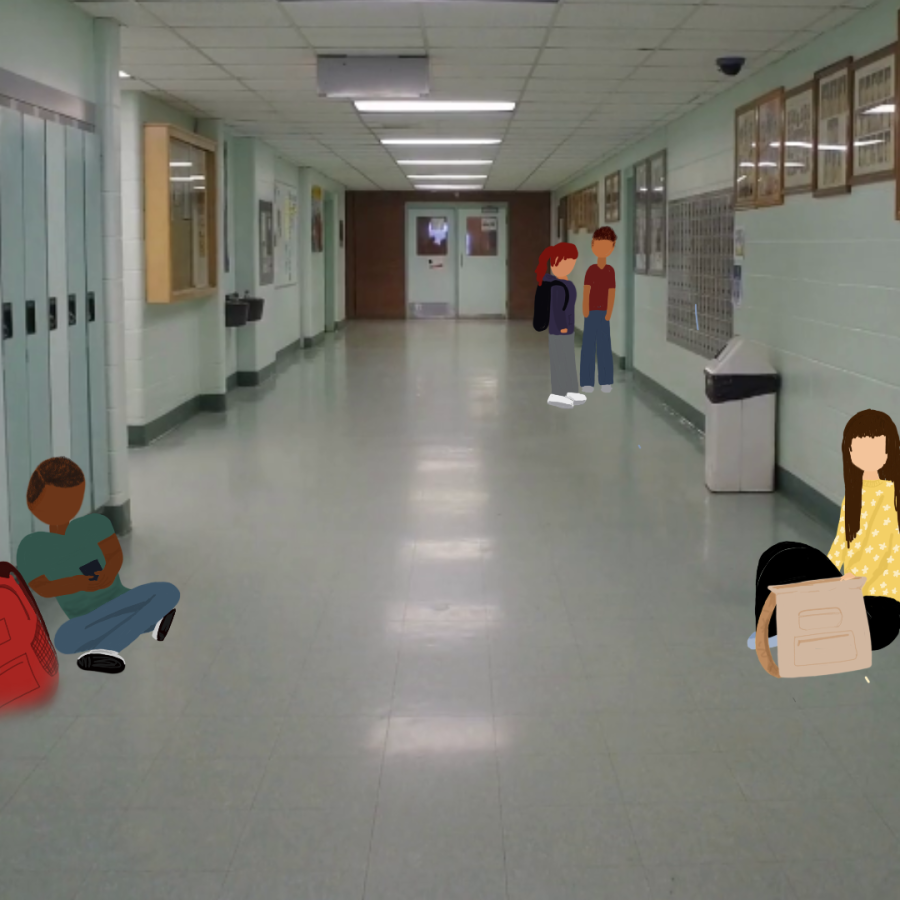Nobody Goes to Class Anymore
April 4, 2023
You are out of class for (insert excusatory reason here), but you are far from alone in this endeavor. There are innumerable other students roaming the halls of IHS: traveling both collectively and individually, contributing to a phenomenon unique to our school. Outlandish occurrences can be seen at all times of the day. Students curling each other’s hair on the bathroom floor, games of tag, and an Uno table setup are just a few. Attendance is a pressing issue, and there have been as many attempted solutions as there are factors of causation. This year, we have seen installments of hall passes and a warning bell that precedes the true bell.
Upon seeking out interview subjects, I encountered a plethora of students out of class, creating numerous opportunities to inquire: what drove you to occupy this particular spot on the bathroom floor? What exactly makes the middle of first period an ideal time to share a pizza? Are you playing tag, or does the practice of sprinting down the hallway have another purpose? I began to notice patterns of where students congregate and recognize familiar faces. Junior Ryder Baig spoke on occupying the theater bathroom instead of class: “It is math. I do not think anybody likes math. [The bathroom] is a just a bigger space, and teachers cannot see us.” This is where community and environmental factors enter the picture. Sophomore Rowan Mason said, “I TA, and I was going to get attendance at the office, and I saw my homie.” It comes down to one’s ability to form community in and outside of the classroom. As social beings, school is always preferable with a friend, apparently even if it is in an odorous restroom. This reasoning is just the beginning.
Students and staff have observed a myriad of other reasons kids are out of class. Woodshop teacher Vander Corely says “I like to blame the phone for everything. Instead of putting the blame on the teachers, I like to blame the phones. We live in a society that likes to be entertained. I think that class is not as entertaining as phones. You could look at TikTok videos or you could listen to me blab on and on. Which would you rather do?” However, Junior Jessie Banks, a junior skipping Corely’s class, says, “It is really loud. Sometimes I just cannot deal. Sometimes I do not mind being in there, because I am supposed to, but it is the environment.”
Assistant principal of attendance Will Buker shares how admin combats these unfitting learning environments by “looking at data reports to find trends, then identifying why.” Buker says, “What is the barrier to being in class? Is the class too hard? Let us put you in a different class. If after first semester a kid never came to first period, why is this kid in that class? So much of it is individualized.” This higher level of intention translates to schedules and special programs. Buker continues, “We have ‘attendance success’ plans. That is when we really dig down into why you are not in class, looping in families, working with counseling, and trying to identify if it is a social-emotional need, an academic issue, or something outside of school.” These specific plans look different for each student. Buker says, “It is a lot of early interventions. Every summer, I look at our list of students who had challenges with unexcused absences or overall attendance. I met with about twenty families in August just to talk about what went well last year, what did not, what classes [students] are taking. If we have kids who really struggle with chronic attendance issues, we look at first period. If you have your favorite class first period, you are more likely to come on time.”
Course scheduling is more customized than a robotic system out to get you by placing P.E. after lunch. There are considerations factoring in how to get students to class. However, this only goes so far. When necessary, admin gets involved, but the effectiveness of that authoritative presence is questioned. Baig says, “Admin tries to get us to go to class. Ms. Kraft knows both of our names, and always eyes us down. They do not walk you to class or anything. They are just like ‘shoo’.” Junior Nick Anderson says, “Certain kids just leave. I do not think teachers care if you do not have a hall pass. I have never been stopped and asked before.”
The institution of the purple permitting paper. The carryout of the hall passes has varied across classes: in some there are towers of passes awaiting admin’s approval, in others the passes are in a neat, untouched stack. Culinary teacher Brenda Fortier says, “It is not reducing anything. It is not solving the problem because it is burdening the kids who do follow the rules and go to class. [The passes] are a pain, they take away from instructional time, and it is not solving the problem of kids being out in the hall when they should not be.” Hall passes are an attempt to put authority back into teachers’ hands, allowing them more control over when students leave class. Another grasp at control is the sound you hear radiating from the loudspeaker exactly 60 seconds before each bell: it is the one-minute warning bell! While observing a group of students gallivanting down the hall, freshman Clara Gibbons says, “The bell is kind of useless. It is not effective now; I do not think it ever will be.” This was the general consensus, but a few students agree with Mason, who say, “It is helpful to make me walk faster.”
There is an undeniable population of students in the halls. Whether that is due to pressure in a class environment and escapism, a found community, or residual unlearned norms leftover from COVID, this is a prevalent ongoing power struggle between students and staff. Senior Kolby Benson says, “I am opposed to being in class, because there are exciting things to do outside of class.” Every day the choice is presented to attend classes or not. What drives your choice IHS?



